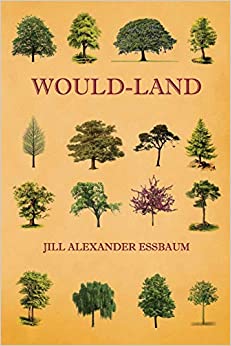
Would Land by Jill Alexander Essbaum
Would Land, the latest poetry poetic collection of Jill Alexander Essbaum is a final impression of a quite extraordinary combination of creative and critical power, of passion and thought.
Amazon USAWould Land, the latest poetry poetic collection of Jill Alexander Essbaum is a final impression of a quite extraordinary combination of creative and critical power, of passion and thought. The poems contain something new, unexpected at every juncture, and convey feelings in simple and unelaborated expressions.
THE RUN-DOWN
Cold, but she never wore overcoats.
Tired, but her cot was rotten and worn.
At a quarter to ten she tried every door.
She had two dry eyes and a mute, mocking pout,
And six dire doubts and seventeen heavens,
And a God who wouldn’t commute her sentence.
She was taxed in a bracket and tossed in a bucket.
She cheated on husbands and sought out her exes.
They didn’t quite hate her so they didn’t quite hit her.
In Run Down, the spontaneous overflow of powerful feelings is evident, the poet takes its origin from emotion recollected in tranquillity, the emotion is contemplated till, by a species of reaction, the tranquillity gradually disappears, and an emotion, kindred to that, which was before the subject of contemplation, is gradually produced, and does itself actually exist in the mind.
DOOR
Half wall, half hole, part
port. A kind of gate. But
wait—it’s not. Locked
in? You’re out of luck.
Don’t knock it till you’ve
tried it. Someone might
be sleeping. A peek thru
the key-slot’s as
good as a bell-ring. For a knob’s
a thing of beauty. Brass
apple. Shiny knurl. Hold
it. Spin it. Wait for the
click. Shoulder it open.
Go in.
In Door, the phrase ‘A peek thru the key-slot’s as good as a bell-ring’ enlightens the understanding of the reader and strengthen the sentiments. Moreover, the materialistic aspect of the poetry is quite impressive and looks engaging.
In 4:13 A.M., the essence of the poem seems to be transpired in a downhearted manner. The phrases Even God has nodded off/ And won’t be taking prayers til ten/You scry the glass. Every serrate shadow flays you/Soon enough, the crow will caw/The cock will crow, embed an element of spirituality, supernaturalness, mysticism, and divination.
4:13 A.M.
The shift of sleepwalks and suicides.
The occasion of owls and a demi-lune fog.
Even God has nodded off
And won’t be taking prayers til ten.
Ad interim, you put them on.
As if your wants could keep you warm.
As if. You say your shibboleths.
You thumb your beads. You scry the glass.
Night creeps to its precipice
And the broken rim of reason breaks
Again. An obsidian sky betrays you.
Every serrate shadow flays you.
In WOULD-LAND, Jill has aptly showed his tremendous spontaneous power of writing in a philosophical tone. The phrase ‘Last night it was snowing/and now/every path’s a pall’ symbolizes a typical contrasting scene between today and yesterday. ‘Though mine the only footfalls/at this hour of awe’, depicts the poet’s solitude in such an eerie atmosphere. ‘Let larksong shudder/to its January wheeze,/but gift these hands a happiness/just once./It is half passed./And I am cold.’ Even the tiniest detail in these lines is remarkable. Every feature of this is remarkable and quite charming and will stay with me forever.
WOULD-LAND
5 a.m. One-quarter past.
Distant chimes inform me this.
A bell peal knells the mist.
And sunlight’s
not yet bludgeoning.
But some light gets blood going.
Last night it was snowing
and now
every path’s a pall.
Though mine the only footfalls
at this hour of awe. Above
hangs a canopy of needle leaf.
Below, the season’s
mean deceit—
that everything stays
white and clean.
It doesn’t, of course,
but I wish it. My prayers
are green with this intent,
imploring winter wrens
to trill and begging scuttling bucks
come back.
There’s something that I lack.
A wryneck
bullet-beaks a branch.
His woodworm didn’t have a chance.
What I miss,
I’ve never had.
But I am not a ghost.
I am a guest.
And life is thirst,
at best.
So do not strike me, Heart.
I am, too, tinder.
I’m flammable
as birch bark, even damp.
Blue spruce, bee-eater—
be sweeter to me.
Let larksong shudder
to its January wheeze,
but gift these hands a happiness
just once.
It is half passed.
And I am cold.
Another peal has tolled.
I’ve told the sum of my appeals.
I need not watch for fox.
They do not congregate at dawn.
But I would,
were I one.
Jill Alexander Essbaum’s Would land is a phenomenal poetic collection. Her style of writing poetry with clarity, directness, and spontaneity is marvelous. Some poems contain melancholic events and impactful emotions that look likeable and impressive. All the poems in this book are prototypical and I can surely give a green signal to the readers that this book is worth buying. No wonder readers, after reading this book if you find yourself in a different world. I hope this book may get immense love and support from readers. All the best Jill!
--- Rochak Agarwal
Jill Alexander Essbaum is the award-winning author of several collections of poetry including Heaven, Harlot, Necropolis, and the single-poem chapbook The Devastation. Her first novel, Hausfrau, debuted on the New York Times Bestseller List and has been translated into 26 languages. Her work has appeared in dozens of journals including Poetry, The Christian Century, Image, and The Rumpus, as well as multiple Best American Poetry anthologies. A two-time NEA fellow, Jill is a core faculty member in The Low Residency MFA Program at University of California-Palm Desert. She lives in Austin, Texas.
